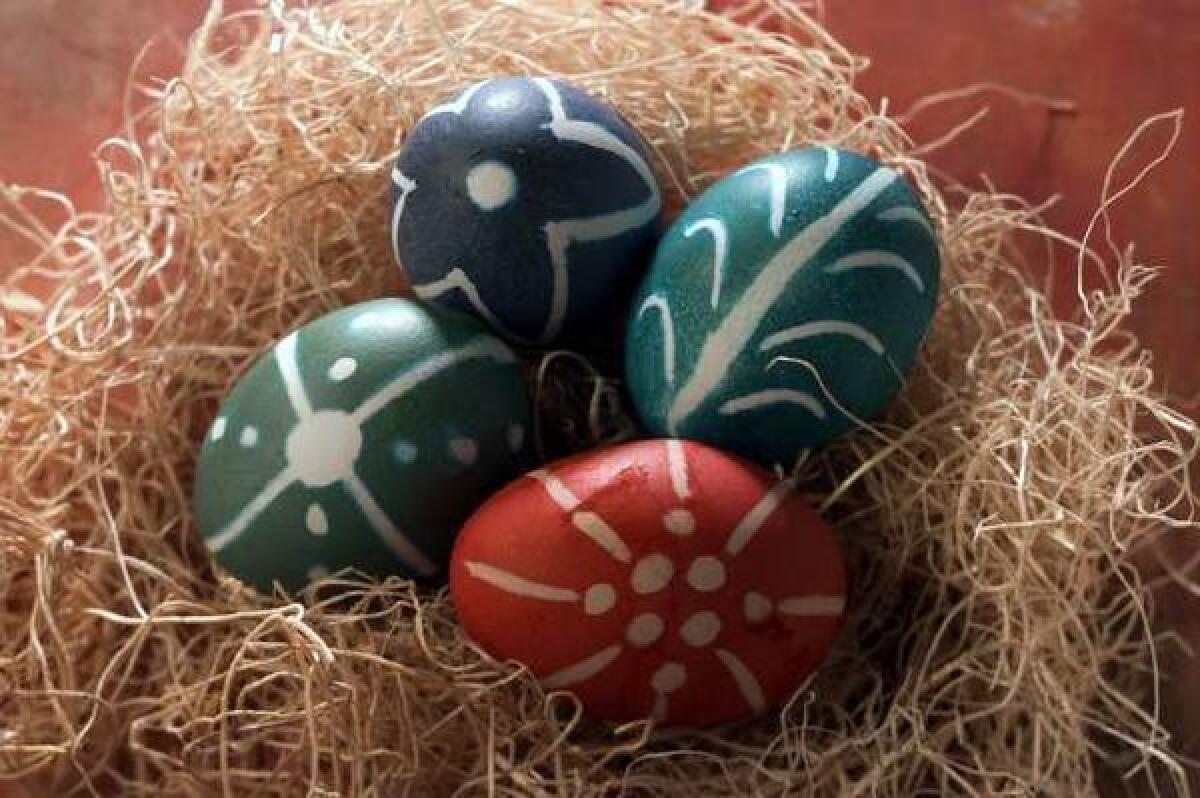Easter egg decorating ideas

Looking for creative ways to decorate your Easter eggs?
A few years back we ran a story on dyeing (and creatively un-dyeing) Easter eggs, taking inspiration from herbs growing in spring gardens and with a little help from vinegar or bleach.
RECIPES: 22 recipes using leftover hard-boiled eggs
Continue reading below for our decorating details. And please share your decorating ideas in the comments below -- we’d love to know what you’re doing to dress up your Easter eggs!
We’re also looking for pictures of your decorated Easter eggs and Easter baskets. Upload them to our reader photo gallery here.
If you have any kitchen tips or questions you’d like me to explore, leave a comment below or email me at [email protected].
ALSO:
Recipe: Celebrate Easter with a “Peeps-tini” cocktail!
Food photography 101: Homemade peeps inspiration
RECIPES: Spring fresh Easter recipes from the L.A. Times Test Kitchen
Spring Leaves
By Tracy Crowe McGonigle
We got our inspiration for these leaf-print dyed eggs from the new herbs that are spouting in our gardens this spring.
The trick is to lay the leaf flat against the surface of the egg, then wrap the egg in cheesecloth to secure the leaf during the dyeing process. Also, the imprint comes out clearer if you hard-boil the egg in water with food coloring and vinegar. Choose one base color, then add additional colors if you want for more depth.
You will need:
Cheesecloth
Scissors
12 to 24 fresh oregano leaves or other herbs of choice
1 small bowl
Water
12 eggs, hard-boiled
String
1 large saucepan
White vinegar
Food coloring
Paper towels
Cut 12 (8-inch) squares of cheesecloth with scissors.
Soak oregano leaves in small bowl of water to cover until soft, about 5 minutes.
Remove leaves from water and lay 1 leaf, top side down, against 1 egg so that leaf is completely flat. Add few drops of water if necessary to make sure leaf remains flat against egg.
Place egg, leaf side down, onto middle of cheesecloth. Repeat with another leaf on opposite side if desired. Bring each corner of cheesecloth together, covering egg, and tie with string.
Repeat with remaining eggs and leaves.
Place eggs in water to cover with 2 tablespoons white vinegar and 10 drops food coloring of choice for every cup of water. Bring to boil, then simmer 12 minutes.
Remove eggs from water and let cool on paper towels.
If additional color is wanted, leave eggs in cheesecloth and stir together 1 cup boiling water, 2 tablespoons white vinegar and 10 drops food coloring of choice. Place still-wrapped eggs in dye until desired color is achieved. Remove from coloring, remove cheesecloth and let dry on paper towels.
Un-Dyeing Affection
The technique of un-dyeing eggs can be as fun as the dyeing. Beautiful patterns can be created on colored eggs by removing the color. The trick is to dye the eggs dark enough so that there is enough contrast when the color is removed.
Ordinary bleach can be used to easily remove the color. Bleach lets you have more control over the design than other methods, but the eggs can then be used only for decoration and not eaten after.
In The Times Test Kitchen we found an alternative to bleach. White vinegar and lemon juice each remove the color from dyed eggs, but in a more painstaking way. More pressure needs to be applied than with bleach, which leaves lines that are less crisp. A Q-tip works better that a brush when vinegar or lemon juice is used; it gives the eggs a slightly rustic look.
You will need:
Water
White vinegar
Food coloring in assorted colors
Several small bowls (1 for each color)
12 eggs, hard-boiled
Spoon
Paper towels
Lemon juice, vinegar or bleach
Paint brushes
Cotton swabs
Stir together 1 cup boiling water, 2 tablespoons white vinegar and 10 drops food coloring of choice in small bowl. Repeat for additional colors or consider mixing 2 colors to make custom one.
Place 1 egg in each color, gently turning with spoon so egg dyes evenly. Remove egg when color has deepened to the desired depth. Drain on paper towels.
Pour small amount of lemon juice, vinegar or bleach into small bowl. (If using bleach, eggs cannot be eaten.)
Dip cotton swab or brush into lemon juice and remove dye on eggs in desired pattern.
More to Read
Eat your way across L.A.
Get our weekly Tasting Notes newsletter for reviews, news and more.
You may occasionally receive promotional content from the Los Angeles Times.










